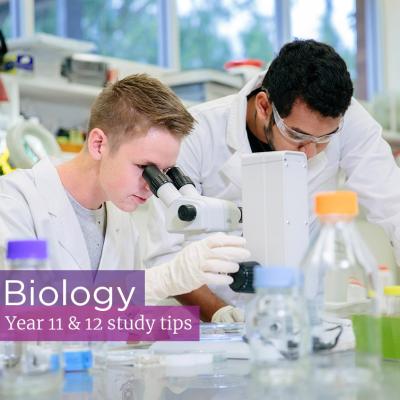Got a Chemistry test coming up? Or are you thinking of picking up Chemistry when you start Year 11? Either way, we’ve got some handy tips for approaching this notoriously tricky subject. Here’s how to study for Chemistry.
To help you rise to the top in your Chemistry class, we got advice from someone who’s been there, done that, and has the 99.9 ATAR to prove it – Penelope Spears, a current Bachelor of Economics / Bachelor of Engineering (Honours) student at UQ. Check out her suggestions for how to study Chemistry.
Is Year 12 Chemistry hard?
First things first, let’s get this truth bomb out of the way.
Yes. Chemistry is a comparatively difficult subject. Many students find the units a little overwhelming until the concepts finally “click” into place.
But even if you’re able to understand new things quickly, Penelope warns that you need to respect this subject and be ready to put in the hard yards.
“Chemistry is one of those subjects that you might think you can slack off in a bit, but it will come back to bite you,” she says.
“It’s definitely a difficult subject and requires a fair bit of work – don’t fall behind!”
There are some high school subjects where you might be able to get by with academic talent and good writing skills – even without putting in the suggested hours. Chemistry is not one of those subjects. Be prepared to dedicate considerable time to revising the content. Some tips for maintaining your study motivation might help along the way.
Enjoying science is more important than being good at maths
You might think having strong mathematical skills will make or break you in Chemistry. But, while there are some elements of maths (like simple arithmetic and substituting values into equations), your maths abilities are unlikely to factor into how well you do in Chemistry.
What’s more important is whether you have a genuine curiosity for Chemistry and enjoy exploring scientific concepts. Since Chemistry is one of those subjects where you need to put in the hours, students who love the topics and are motivated to study them tend to do the best.
How to study Chemistry
Despite her initial warning, Penelope says it’s far from impossible to do well in Chemistry with some good study habits.
“My biggest tip is to write summaries of the content you learnt each week and create a document with all the important chemical equations you learnt,” she suggests.
Committing to regular revision and keeping up with the content from your classes is a recurring theme in Penelope’s advice for Chemistry students. This is more important than ever in what she deems the hands-down most difficult topic in the subject: organic chemistry.
“You have to memorise almost 20 reaction pathways and how they all interact with each other for the external exam,” she says.
“It is incredibly frustrating, but eventually it just clicks.”
Penelope learnt firsthand how troublesome it can be to leave revision to the last minute for organic chemistry, and she hopes her experience can be a cautionary tale for current students.
“I left myself 7 days to effectively teach myself organic chemistry and it was very stressful,” she says.
“Do not fall behind on this.”
For revising organic chemistry, Penelope recommends these steps:
- Write a summary of each reaction.
- Get a diagram of all the reaction pathways.
- Use the diagram to answer practice questions until you don’t need it anymore.
If you don’t fully grasp a concept or reaction that you’re revising, ask your teacher to clarify it for you at the next opportunity. Memorising is not the same as understanding.
How to study for Chemistry exams
If you’ve read this far, you won’t be surprised by Penelope’s main advice for exam prep: maintain a consistent revision routine throughout the year.
“If you stay on top of the content and spend about half an hour each week going over the content you learnt that week, then you won’t need to do too much revision come exam time,” she says.
Apart from that, it’s important to firmly understand the foundations of each Chemistry topic. If you’ve got those down, Penelope believes the exams aren’t as intimidating as you might think.
“Everyone expects the external exam for Chemistry to be really hard with unpredictable questions,” she says.
“But, in reality, just having a basic understanding of concepts will get you a long way.”
Her final advice for how to study for the Chemistry exam is to remember and revise your practical experiments from throughout the year.
“Pay attention to the pracs you do, because you can be asked about them in the external exam.”
So, should you study Chemistry?
If you’re in Year 10 and thinking about trying Chemistry (or in Year 11 and on the fence about continuing with it next year), Penelope has mostly good things to say about it.
“If you enjoy Chemistry and are willing to work, then go for it,” she says.
“It’s lots of fun and the internal assessment is relatively doable… just be prepared for a bit of stress!”
But stress is a somewhat unavoidable element of all Year 11 and 12 subjects, really. The main thing is knowing how to handle it, and an important part of that is maintaining a healthy study/life balance during senior school.
Keep in mind that studying at least one science subject – such as Chemistry, Physics or Biology – is a prerequisite for several university degrees. Make sure to consider this if you’re on the fence about starting or continuing with Chemistry.
For advice on doing your best in all your subjects – and more great study tips from Penelope – read How to get a high ATAR. Or explore study guides for your other subjects.






